Managing dental problems at home during coronavirus (COVID-19)

If you don't already have an NHS dentist and need to find a dental practice taking on NHS patients for urgent dental treatments or routine dentistry, you may find this a difficult task due to Covid 19.
If you are struggling to find a practice, we recommend calling all of your local dentists to make an appointment as a new patient. Often by explaining that you require urgent dental care, they may provide an emergency appointment the same day. Examples of urgent requirements include bloody gums, abscesses or if you are in severe pain.
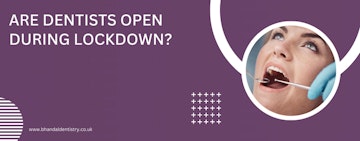
Are Dentists Open During Lockdown?
Throughout the Covid-19 pandemic, restrictions and rules have changed, affecting all health care services. At times all dental practices were closed, then they could reopen for emergency patients, and then they could reopen fully for routine appointments (some for just under 18s). How your dental practice operates is often down to them and their current staff levels or local coronavirus covid 19 government restrictions.
At Bhandal Dentistry, we are open, offering remote triage and urgent dental care. If you are having any issues we are happy to see you. Over the coming weeks as rules are relaxed we will offer more routine appointments. Please ring the surgery first, do not just turn up. We also keep our website updated with news and updates which could be helpful for you to check first.
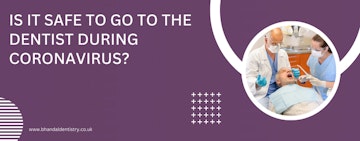
Is it safe to go to the dentist during coronavirus?
At Bhandal Dental Practice we have taken a number of measures to ensure that the practice is 'COVID SECURE' for the safety of both our patients and our dental team.
Dental practices have to be sterile environments at all times to prevent infection, even more so during a global pandemic. Dentists may have their own rules around how they're currently operating, but generally, they will:
- Encourage you to contact them if you have any Covid 19 symptoms
- You will most likely wait outside to enable social distancing
- Your temperature may be taken once entering the practice, and you will be asked again if you have Covid 19 symptoms.
- You will be required to wear a mask unless you have a personal exemption.
- The waiting room will likely be closed or have strict social distancing measures in place with limited people allowed in.
Whatever Covid-19 safety measures you find in place at your local dentist's surgery will be there to keep you and the staff safe.
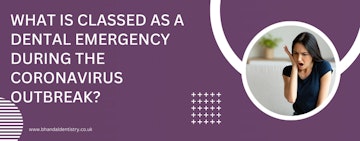
What is classed as a dental emergency during the coronavirus outbreak?
The majority of practices are only currently conducting face-to-face access for clients with urgent problems. Emergency appointments are limited and will likely be given to people who are suffering with:
- Swollen gums, cheeks, or face that is continuing to spread or not reducing with home remedies such as aspirin or ice packs
- Excruciating tooth pain that is affecting day-to-day life
- Ulcers if they have not healed by themselves within two weeks
- If there's been a recent tooth extraction and the patient is experiencing heavy bleeding
- A broken tooth or crown that has led to pain
- A tooth that's been knocked out with force
- Facial trauma that's led to bleeding
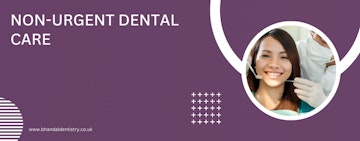
Non-Urgent Dental Care
We are fully staffed, fully open and hoping to see and treat as many of our patients as possible, whether you're suffering from urgent or non-urgent dental problems - or if you want to make a routine appointment for a check up.
If your practice considers your dental problem as requiring non-urgent dental treatment they may be able to advise you over the phone on how to treat this at home. Some dental practices may not grant a dental appointment for the following things:
- A toothache that's minor and causes a dull aching pain, or comes and goes
- A wisdom tooth that is causing discomfort without swelling or causing a restriction when it comes to opening the mouth
- A tooth that is feeling sensitive
- Sensitive gums
- Bloody gums
- A sharp pain that happens when you bite down
- Mouth ulcers that have been present for under two weeks
- A chipped or broken tooth
- A loose veneer or crown
- Denture discomfort
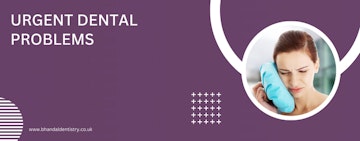
Urgent Dental Problems
Urgent dental problems, to the point where hospital treatment is required, includes:
- A swollen or swelling face that is affecting a person's ability to breathe or swallow
- A swollen or swelling face that is affecting a person's vision
- Trauma to the head that has resulted in double vision, vomiting, or a lack of consciousness
- Uncontrollable bleeding from a person's mouth
- Blood that is rapid and relentless from a person's mouth.
Straight to A & E
If you, or someone you live with, are suffering from any of the problems listed above, they should go straight to A & E as immediate care, support, and treatment are imperative.
How do I find a dentist during coronavirus?
You can find a dentist by searching through the NHS search menu for a dentist near you, or via an internet search menu. By describing your symptoms to a practice, they may be able to either take you on as an NHS patient, emergency patient (where you'd have to pay for the entirety of your treatment) or they may be able to offer advice.
You could also call the NHS Helpline phone line for healthcare support or find dental treatment on 111.
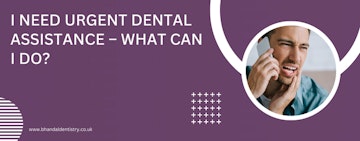
I need urgent dental assistance – what can I do?
If you feel that you require urgent dental care you can call your nearby practice for guidance. If it is out of hours, they may have left guidance for what to do to obtain treatment on their voicemail.
Alternatively, you could call the NHS 111 to find a dental practice close to you.
You shouldn't contact your GP or GP surgery as they will not provide urgent dental care. If you're experiencing discomfort, you should take painkillers and look for self-care advice through the NHS website.
Mouth pain
Mouth pain can be due to a range of reasons and the majority of them will ease on their own. You can look for guidance on the NHS website or by calling the NHS non-emergency number for advice. Depending on the cause, there some things you could try for yourself at home:
- Brushing your teeth - the discomfort could be due to food being stuck under a tooth and aggravating the gum. Brush your teeth, gargle, and swirl with mouthwash and floss to eliminate this common issue.
- Take medication at home - alternate between anti-inflammatories and paracetamol
- Try oral gels - with many on the market, offering different treatment strengths, you can purchase an effective oral gel over the counter in a pharmacy, supermarket, or online.
- Ice packs - if the pain is localised, you can try to reduce it by applying ice to the affected area
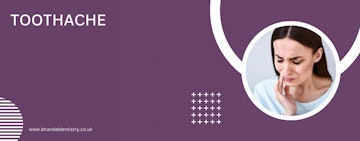
Toothache
Mild, moderate or severe toothache is an unfortunate part of life. The cause is often similar, or you may need to improve your dental care routine or seek specialist advice from an oral hygienist. Toothache is not usually severe, but if it affects your health or day-to-day life, or if it comes with other symptoms, you should try to see a dentist who can determine and treat the cause.
Wisdom Teeth
The last teeth to appear are the wisdom teeth, often not emerging until the late teens, twenties, or even thirties. It isn't unusual for a wisdom tooth to be impacted (stuck below the surface of the gums) or to grow at an odd angle which could cause complications and severe pain if the tooth is not removed.
Often wisdom tooth extraction can be performed at a dentist's practice, but there are many reasons you would be offered an appointment at a dental hospital for this. If you are experiencing extreme wisdom tooth pain and it is limiting your mouth movement, you may be able to get an emergency appointment to have the tooth removed.
Mouth Ulcers
Mouth ulcers are generally nothing to worry about and will often disappear as quickly as they arrived. If you're finding that they're not going within two weeks, contact the NHS health line or your nearest dental surgery as they may need more specialised treatment or be a symptom of an underlying health problem.
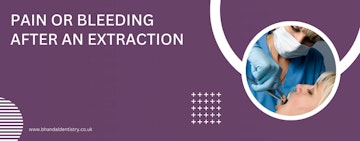
Pain or bleeding after an extraction
Mild to moderate pain and bleeding following a tooth extraction is to be expected and can usually be treated at home with painkillers, such as anti-inflammatories, and by biting down on gauze. Try not to aggravate the gums by smoking, vaping, having hot drinks, or eating spicy food. If you're still experiencing discomfort or blood that will not subside, you should contact a medical professional for advice.
Bleeding Gums
This could be for many reasons - gum trauma, brushing too hard, or infections like gingivitis. It is usual for everyone to experience a little blood now and then when brushing, but if it doesn't stop, seems excessive, or comes with additional symptoms, then you could be at risk of further dental problems and should seek medical advice.
Lost Crown
This will unlikely be considered an emergency, but you could still contact your nearby medical team, who could provide support and safety advice until you're able to access your dentist for proper treatments.
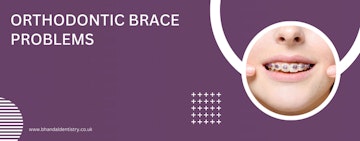
Orthodontic Brace Problems
It would depend on your orthodontic brace problem as to whether you could get access to your usual dental care provider. If you are a private patient, you may have more luck getting an appointment.
Fractured or knocked-out teeth
A knocked-out tooth should be dealt with by emergency services if you cannot see an out-of-hours dentist team. Search for your nearest dental surgery to make enquiries. You could also visit your local accident and emergency department who will check that the entirety of the tooth has gone to prevent infection.
Oral hygiene
It has never been more critical during the current climate to take care of your teeth at home, brush a minimum of twice a day, floss, and use a fluoride mouthwash daily.
When are dentists going to reopen
Check with your local surgery or search for information on their website, or within the Government's website for a definitive answer. Bhandal Dental Practise is currently open for all patients and we will remain open throughout the lockdown period.
Call us now to make an appointment

Keep reading...
How A Smile Makeover Can Increase Your Confidence
When patients want to achieve a dramatic transformation, we often recommend a smile makeover. This bespoke treatment plan can mean…
What is SmileFast?
SmileFast is a new dental treatment plan that allows you to achieve a dramatic smile transformation in as little time…
Anti-wrinkle injections - All you need FAQ's
The most common cosmetic treatment in the world now is anti-wrinkle injections. It's a simple and effective technique that involves…
What are Veneers?
Veneers are thin coats fitting over the teeth, protecting them from damage and creating a lovely smile. The tooth-coloured shells…

Hear from our
happy patients
These are just some of the kind words about our practice, direct from our incredible patients.









